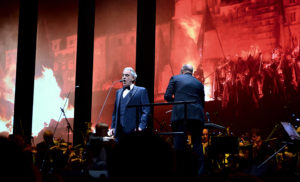
Andrea Bocelli Tour 2019–20 Review: Kaunas
The Famed Tenor Delivers A Well-Designed Product That Lacks True Operatic Substance
By Polina Lyapustina(Credits: Dmitry Lyapustin)
On Friday evening at 7:55 p.m. the Žalgiris Arena was full. People rushed to take their places after the hell they had to survive in the parking lot — the biggest indoor arena of the Baltic States somehow was not prepared for so many people coming to the show.
“The world’s most beloved tenor” comes to Lithuania every two years and constantly holds sold-out performances.
At 8:00 p.m., the Lithuanian State Symphony Orchestra and the choir were on stage, conductor Carlo Bernini (from the Bocelli’s team) joined them without delay. After a symbolic greeting, they started the concert with Bizet’s Farandole — an impressive and yet really short piece, but we haven’t known yet that it has actually set the mood of the whole evening.
Reaching the Peaks
After a rather modest applause for the orchestra, Andrea Bocelli appeared on stage in seconds and the auditorium exploded in greeting. I looked at the program — it was smart but also very lean, more a product than art prepared to be consumed this evening. A palette of well-recognizable arias of Puccini, Verdi, and Massenet, with a final duet from Giordano’s “Andrea Chenier” mixed in for more sophisticated listeners.
The tenor began to sing “La donna è mobile” with no greeting to the audience. This “perfect starter” didn’t work out. We all immediately understood that Bocelli’s voice has changed. It was still strong, and Bocelli reached powerful and robust peaks, keeping every climax defiantly longer than the audience expected. But besides those moments he lacked flexibility, performing in a rather staccato style, and gave up pianissimos. Melodic lines were pushed to the orchestra part, while tenor mostly pronounced words, preparing for the next peak note.
Every following number proved that the whole repertory of the evening was made up of the short pieces or some kind of “radio edit” versions of the longer ones. So any experienced listener would find one or another part of the aria missing.
The exception was “Vicino a te,” which Bocelli performed with soprano Francesca Maionchi. It sounded longer than expected and lacked peaks or any dramatic effects so important for this duet. The young soprano seemed simply unprepared for this role and sang happily, as her last “Son’io” before heading to the guillotine was rather “I do” of a happy bridesmaid.
Beautiful Support
Maionchi was not the only supporter for Bocelli in this concert — this show as a product was made up well and completed.
Another major performer was Ukrainian violinist Anastasiya Petryshak. Once on stage she stole the attention of the audience through her passionate playing and her stunning red dress. Not a single detail left unreasoned by the organizers. Petryshak remained on stage for most of the following songs.
The first part ended with “Libiamo ne’lieti calici” and this piece was Francesca Maionchi’s finest hour — Violetta suited her voice, but then we couldn’t ignore how the soprano kept her sound down to provide room for the tenor’s smaller sound. The choir here gave a stunningly original interpretation, creating a massive festive background for the soloists’ duet.
During the intermission, people sounded excited exclaiming “what a girl;” “what a dress;” “he’s still slim.” There were no comments on singing though. One friend with a musical (but not classical music) background told me: “It might be not perfect, but it’s impressive anyway. All those notes.”
“Opera is not just those notes,” I thought, “but notes are good to sell the impression.”
The second part was dedicated to popular songs. It started with Morricone’s “Mission” and contained songs by Rodrigo, D’Anzi, Armstrong, and Sartori. It might seem easier for Bocelli with his profound experience in collaborating with pop stars, and yet melodic lines were not given to him in any way.
Pop singer Ilaria Della Bidia, who accompanied tenor on stage, just emphasized this problem, shining out with her vocal swirls.
Giving The Wrong Impression
I thought again about this impression, my friend mentioned. What’s wrong with the impression given that night? Bocelli’s brilliantly thought-out title “The world’s beloved tenor” which in fact means the one who sold the most copies of his recordings, contains not only love, which is measured in money, but also a very important word — tenor. The word which originally means a voice type, but for people, is inextricably linked with opera.
“The most complex art” that night was simplified to pronouncing text from the libretto, reaching impressive peak notes, and inviting beautiful guests on stage. Over 15 000 people would call it world-class operatic performance.
And that was the most disappointing. I would be calmer if I thought that they knew it actually wasn’t. But I remembered a semi-empty hall at an amazing concert by Plácido Domingo just a year ago. The concert that presented a singer who with his great mastery could overpower the voice changes, trends, and time was attended by at least four times fewer people. There was no buzz about it.
But at Bocelli’s concert, the level of singing was supposed to be certainly the highest. And even if people didn’t know but felt something went wrong, they would think “Who am I to criticize?”
And so I do. I’m not a singer. And nothing I could say or write is as important as any singing on stage, and moreover as the singing of Andrea Bocelli. I admit it fully. And I know, respect, and admire the talent of this great musician. But I had to declare that nothing I’ve heard that evening was even close to his past greatness or the understanding of decent operatic singing.
And while my work might be nothing to compare with any performance of Andrea Bocelli, I clearly see something more important and valuable than the singing of any greatest tenor in the world. It is opera itself as art. The art, which today becomes a product. The art, which cannot survive without its audience and their understanding.
And that is why the audience must be treated to the best when they are promised singing from the world’s most beloved tenor. Because this singing is a basis of operatic art. The basis of what people will declare the great opera of tomorrow. And neither a perfectly staged show, nor beautiful people, nor dancers, nor old hits will give this comprehension.
Andrea Bocelli was performing his program smiling but in a rather absent mood. During the whole evening, he said just one very quiet “thank you” and another “thank you very much” as the arena was exploding with the standing ovation, never letting him go after another well-planned encore.
He performed three extra songs, coquettishly approaching the exit but never leaving the stage. After the last — shortened again — “Nessun Dorma” he walked around the stage with the conductor, greeting the audience, then left. The audience left the hall sooner and no one doubted that tenor would return with another highly anticipated performance in two years.
On the way back from Kaunas, we played some arias and songs by another tenor on Spotify for my friends. In a car. After midnight.
“That’s unbelievable. Simply nothing to compare. Can you play more?”
They couldn’t imagine something like this after that concert. And I couldn’t imagine myself turning on someone else’s songs after the live performance of great Andrea Bocelli. But there was something decisive, something I really cared about: my friends deserved to get the right impression of the Artform that is so important for me.



